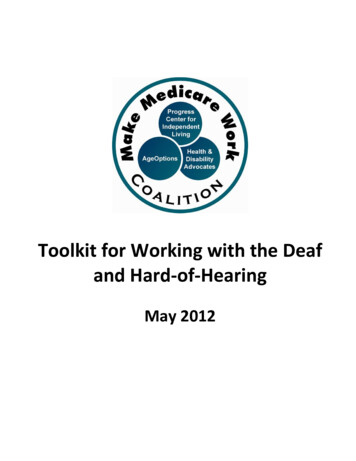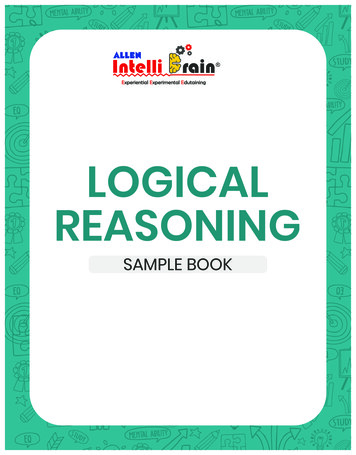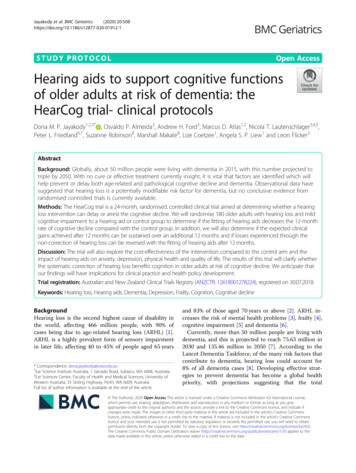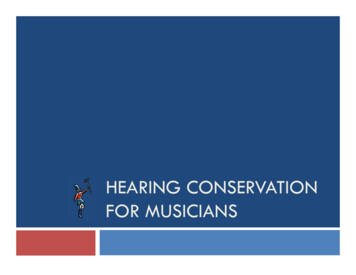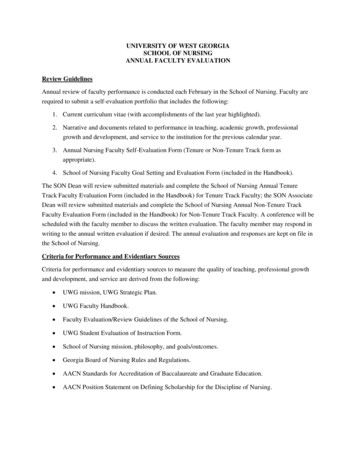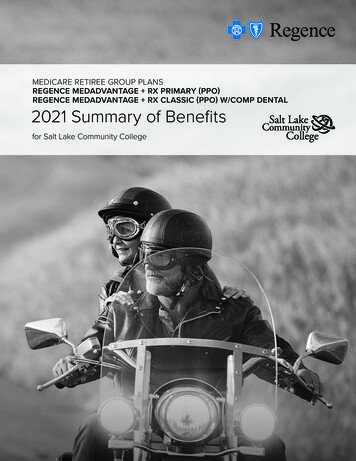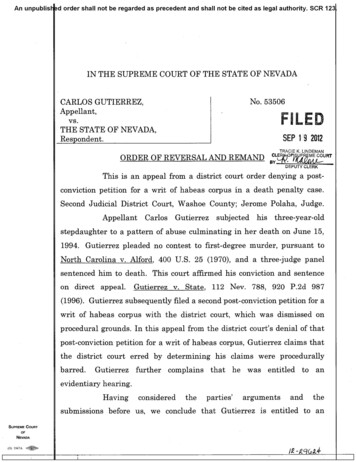
Transcription
evidentiary hearing regarding his ability to overcome the procedural barsto further consideration of his death sentence. We also note several issuesof concern that need further development on remand.Gutierrez's death sentence has been addressed in two other,independent proceedings: (1) in Case Concerning Avena and OtherMexican Nationals (Mex. v. U.S.) (Avena), 2004 I.C.J. 12 (March 31), theInternational Court of Justice (ICJ) held that the United States violatedArticle 36(1)(b) of the Vienna Convention on Consular Relations, Dec. 14,1969, 21 U.S.T. 77, by failing to inform Gutierrez of his right to consularassistance in defending his capital murder charge, id. at 51; and (2) inState v. Gonzalez, Case No. CR96-0562 (Nev. Second Jud. Dist. Ct.), theinterpreter for the three-judge panel that sentenced Gutierrez to deathwas convicted of perjury for having falsified his credentials at Gutierrez'sdeath penalty hearing.Avena addressed the convictions and sentences of 51 Mexicannationals, of whom Gutierrez is one. On its face, "[t]he decision inAvena . . . obligates the United States 'to provide, by means of its ownchoosing, review and reconsideration of the convictions and sentences ofthe [affected] Mexican nationals,' with a view to ascertaining' whether thefailure to provide proper notice to consular officials 'caused actualprejudice to the defendant in the process of administration of criminaljustice."Medellin v. Texas (Medellin I), 552 U.S. 491, 536 (2008)(Stevens, J., concurring) (third alteration in original) (citation omitted)(quoting Avena, 2004 I.C.J. at ¶153(9); id. at ¶ 121).Avena does not obligate the states to subordinate their postconviction review procedures to the ICJ ruling. Thus, the Supreme Courthas rejected post-conviction claims similar to Gutierrez's by two otherSUPREME COURTOFNEVADA(0) 1947A2
Avena defendants, Humberto Leal Garcia and Jose Ernesto Medellin,holding that "neither the Avena decision nor the President's Memorandumpurporting to implement that decision constituted directly enforceablefederal law," Leal Garcia v. Texas, 564 U.S. „ 131 S. Ct. 2866, 2867(2011) (5-4 decision), to which state procedural default rules must yield.Medellin I, 552 U.S. at 498-99. Nonetheless, in declining to stay LealGarcia's and Medellin's executions, the Supreme Court noted that neitherhad shown actual prejudice to a constitutional right due to lack of timelyconsular access. Medellin v. Texas (Medellin II), 554 U.S. 759, 760 (2008)("[t]he beginning premise for any stay [of execution] . . . must be thatpetitioner's confession was obtained unlawfully," and thus that thepetitioner was "prejudiced by his lack of consular access"); Leal Garcia,564 U.S. at , 131 S. Ct. at 2868 (noting that, in supporting LealGarcia's application for a stay of execution, "the United States studiouslyrefuses to argue that Leal was prejudiced by the Vienna Conventionviolation," and that "the District Court found that any violation of theVienna Convention would have been harmless" (citingLeal v.Quarterman, No. SA-07-CA-214-RF, 2007 WL 4521519, at *7 (W.D. Tex.Dec. 17, 2007), vacated in part sub nom. Leal Garcia v. Quarterman, 573F.3d 214, 224-225 (2009))). And while, without an implementing mandatefrom Congress, state procedural default rules do not have to yield toAvena, they may yield, if actual prejudice can be shown.See Medellin I,552 U.S. at 533, 536-37 & n.4 (Stevens, J., concurring) (discussing Torresv. State, No. PCD-04-442, 2004 WL 3711623 (Okla. Crim. App. May 13,2004), where the State of Oklahoma "unhesitatingly assumed" the burdenof complying with Avena by ordering "an evidentiary hearing on whetherTorres had been prejudiced by the lack of consular notification"; Justice3
Stevens rightly described this burden as "minimal" when balanced againstthe United States' "plainly compelling interests in ensuring the reciprocalobservance of the Vienna Convention, protecting relations with foreigngovernments, and demonstrating commitment to the role of internationallaw" (internal quotation marks omitted)).Unlike Medellin and Leal Garcia but like Torres, Gutierrezarguably suffered actual prejudice due to the lack of consular assistance.The Mexican consulate in Sacramento (the closest to Reno, whereGutierrez's death penalty hearing occurred) has provided an affidavitswearing that it would have assisted Gutierrez had it been timely notified.Although the form its assistance would have taken remains unclear—adeficiency an evidentiary hearing may rectify—cases recognize that, "[inaddition to providing a 'cultural bridge' between the foreign detainee andthe American legal system, the consulate may. 'conduct its owninvestigations, file amicus briefs and even intervene directly in aproceeding if it deems that necessary."Sandoval v. United States, 574F.3d 847, 850 (7th Cir. 2009) (quoting Osagiede v. United States, 543 F.3d399, 403 (7th Cir. 2008)).It is apparent that Gutierrez needed help navigating theAmerican criminal system. At the time of his arrest, Gutierrez was 26years old, had the Mexican equivalent of a sixth-grade education, andspoke little English. Rather than go to trial, he entered an unusual nocontest plea to first-degree murder. His sentence was determined after anevidentiary hearing by a three-judge panel.' Both he and his wife were'Gutierrez was sentenced to death by a three-judge panel before thedecision in Ring v. Arizona, 536 U.S. 584, 609 (2002), which holds that asentencing judge, sitting without a jury, may not find aggravatingcontinued on next page.4
charged in connection with the death of their three-year-old daughter.There is some suggestion that his wife's role was greater than came out athis penalty hearing.A number of witnesses testified at Gutierrez's penalty hearing,some Spanish-speaking. Gutierrez and the State each had an interpreter,but the court had its own interpreter as well, Carlos Miguel Gonzalez, whointerpreted for 3 of the State's 16 witnesses. 2 A year after Gutierrez wassentenced to death, interpreter Gonzalez pleaded guilty to perjury that hecommitted during Gutierrez's death penalty hearing, when he swore hewas certified and formally educated as an interpreter but was not. 3.continuedcircumstances necessary for imposition of the death penalty. See alsoNRS 175.554(2) ("the jury shall determine. . . whether an aggravatingcircumstance or circumstances are found to exist").2 Thelegal status of court interpreters is unclear. Charles M.Grabau & Llewellyn Joseph Gibbons, Protecting the Rights of LinguisticMinorities: Challenges to Court Interpretation, 30 New. Eng. L. Rev. 227,287-88 (1996). The commentary to Canon 3 of the Model Code ofProfessional Responsibility for Interpreters in the Judiciary (Nat'l Ctr.State Courts 2002) states that "Mlle interpreter serves as an officer of thecourt and the interpreter's duty in a court proceeding is to serve the courtand the public to which the court is a servant."3 Gonzalez'spresentence investigation report gives this account of hisfalse testimony during Gutierrez's death penalty hearing:On August 8, 1995 . . . Gonzalez was called uponto act as an interpreter for the state of Nevadawith respect to a death-penalty phase of thecapital murder case entitled, "The State of Nevadavs Carlos Gutierrez", #CR94-1795 . . . .continued on next page.5
.continuedDuring direct questioning, and after being dulysworn, [Gonzalez] represented to the Court that hewas certified as an interpreter in both the state ofCalifornia and within the federal system. Mr.Gonzalez also, under direct questioning, informedthat he had been educated at the University ofMadrid for one year studying Spanish Literature.He went on to report receipt of a Bachelor's Degreein Spanish Literature with a minor in ComputerScience received at the University of Arizona.Lastly, with respect to his education, Mr. Gonzalezreported his possession of a Master's degreereceived from the University of San Diego in thefield of Linguistics. Additionally, Mr. Gonzaleztestified to having served as an interpreter for theSuperior Court in California for approximatelyseven years.Shortly thereafter, an investigation was initiatedby the Washoe County, Nevada, Public Defender'sOffice so as to ascertain the defendant's truecredentials. During that investigation it waslearned that Mr. Gonzalez had completelyfabricated his educational and employmentbackground. [Among other things], it was learnedthat Mr. Gonzalez had never been certified withinthe state of California or by any federal entity asan interpreter and therefore could not haveworked as an interpreter within the CaliforniaCourt system. . . . Mr. Gonzalez did not receiveany type of certificate or degree from theeducational facilities [he named nor] evenattended. . . either the University of SanDiego . . . or the University of Arizona.While NRS 176.156(5) generally provides for the confidentiality ofpresentence reports, the Gonzalez presentence report is part of the recordon this appeal and in the docket, neither of which is sealed.SUPREME COURTOFNEVADA(0) 1947A6
The United States Constitution does not require certifiedinterpreters. 4 United States v. Si, 333 F.3d 1041, 1043 n.3 (9th Cir. 2003)(citing Perovich v. United States, 205 U.S. 86, 91 (1907)). But it doesrequire reliable evidence. 5Gutierrez's death penalty hearing was not tape-recorded.However, the certified court reporter's transcript reports exchangesbetween the defense interpreter and the State's interpreter expressingconcern with court-interpreter Gonzalez's accuracy. In addition to aspecific dispute over whether a word meant "hit" or "spank," oneinterpreter noted that Gonzalez relied on Cuban-Spanish, not theMexican-Spanish the witnesses spoke. Alone, these technical flaws might4 Nevertheless,there is a growing movement that encourages orrequires court-appointed certified interpreters. See, e.g., 28 U.S.C. § 1827(2006); Minn. Gen. R. Pract. § 8.02 (2012); Or. Rev. Stat. § 45.275 (2011);Tenn. S. Ct. R. 42(3) (2012); Tex. Gov't Code. Ann. § 57.002 (2012). Seealso Maxwell Alan Miller et al., Finding Justice in Translation: AmericanJurisprudence Affecting Due Process for People with Limited EnglishProficiency Together with Practical Suggestions, 14 Harv. Latino L. Rev.117, 150 (2011) (recommending certified or qualified interpreters in allstages of the proceedings).5 InNevada, criminal defendants who do not understand Englishhave "'a due process right to an interpreter at all crucial stages of thecriminal process." Ouanbengboune v. State, 125 Nev. 763, 768, 220 P.3d1122, 1126 (2009) (quoting Ton v. State, 110 Nev. 970, 971, 878 P.2d 986,987 (1994)). Although an interpreter does not have to perform word-forword interpretations, errors that fundamentally alter the defendant'sstatements or the context of his statements may render the interpretationconstitutionally inadequate. Baltazar-Monterrosa v. State, 122 Nev. 606,614-17, 137 P.3d 1137, 1142-44 (2006). Here, Gutierrez's interpreter'sskills are not challenged. The challenge is to the accuracy of theinterpreter who translated the State's Spanish-speaking witnesses for thecourt.SUPREME COURTOFNEVADA7(0) 1947A
not amount to much, but they must be considered in conjunction with thedeeper, more disturbing issue as to the integrity of Gonzalez's services asan interpreter. At the sentencing hearing for Gonzalez, in urging asignificant sentence for his perjury, the State described interpreterGonzalez as "a sociopath" who, while "articulate, well groomed, [and] wellmannered . . . does not know how to recognize or offer truthful assertions."Perhaps exaggerating things—but perhaps not—the State furtherdescribed interpreter Gonzalez's role as "integral" to the Gutierrez "deathpenalty hearing where he was interpreting." The State cannot now dismissthe gravity of Gonzalez's role in the death penalty process nor ignore thepotential dishonesty during translation given its own statements atinterpreter Gonzalez's sentencing hearing.The dissent suggests that any mistranslations that occurredwere not prejudicial to Gutierrez because they were "resolved on therecord" or were "collateral." However, the record indicates thatGutierrez's interpreter repeatedly objected to Gonzalez's interpretingmistakes until she was told to "stop objecting" by the State's interpreterand that Gutierrez's interpreter felt intimidated by Gonzalez. This alonewarrants further consideration because of the duty court interpreters haveto serve the court and the public. Reasonable minds can differ on whetherthese errors were prejudicial and that is precisely the reason anevidentiary hearing is necessary.Additionally, without an evidentiary hearing, it is not possibleto say what assistance the consulate might have provided. Would theproblems with interpreter Gonzalez have been recognized and addressedearlier? Would the hearing have been tape-recorded, in addition tostenographically reported? What is clear, though, is if a non-SpanishSUPREME COURTOFNEVADA(0) 1947A8
speaking U.S. citizen were detained in Mexico on serious criminal charges,the American consulate was not notified, and the interpreter whotranslated from English into Spanish at the trial for the Spanish-speakingjudges was later convicted of having falsified his credentials, we wouldexpect Mexico, on order of the ICJ, to review the reliability of theproceedings and the extent to which, if at all, timely notice to theAmerican consulate might have regularized them. Perhaps timelyconsular notice would not have changed anything for Gutierrez; perhapsthe interpreter's skills, despite his perjury, were sound. These are issueson which an evidentiary hearing needs to be held.Accordingly, weORDER the judgment of the district court REVERSED ANDREMAND this matter to the district court for proceedings consistent withthis order.C.J.J.J.J.9
cc: Hon. Jerome Polaha, District JudgeFederal Public Defender/Las VegasAttorney General/Carson CityWashoe County District AttorneyPotter Law OfficesNorthwestern University School of Law, Bluhm Legal ClinicWashoe District Court ClerkSUPREME COURTOFNEVADA(0) 1947A10
PARRAGUIRRE, J., with whom HARDESTY, J., agrees, dissenting:I would affirm the district court's denial of Gutierrez's postconviction petition for a writ of habeas corpus on the ground that it isprocedurally defaulted. Because his post-conviction petition was untimelyand successive, it was procedurally barred absent a showing of good causeand prejudice. NRS 34.726(1); NRS 34.810. To overcome the proceduralbars, Gutierrez argued three circumstances provided good cause. First, heargues that post-conviction counsel's ineffectiveness caused the delay infiling his post-conviction petition; however, that claim itself isprocedurally barred and cannot satisfy good cause. See State v. Dist. Ct.(Riker), 121 Nev. 225, 235, 112 P.3d 1070, 1077 (2005) (concluding thatclaims of ineffective assistance of first post-conviction counsel are notimmune to the timeliness bar of NRS 34.726). Second, Gutierrez contendsthat this court's inconsistent application of procedural bars excuses thedelay; however we have repeatedly rejected this argument. Riker, 121Nev. at 236, 112 P.3d at 1077 (concluding that this court does notarbitrarily "ignore] ] procedural default rules" and that "any priorinconsistent application of statutory default rules would not provide abasis for this court to ignore rules, which are mandatory"). Third, hisassertion that any delay in filing his post-conviction petition was not hisfault as contemplated by NRS 34.726(1) fails. See Hathaway v. State, 119Nev. 248, 252, 71 P.3d 503, 506 (2003) (concluding that petitioner mustshow that "an impediment external to the defense prevented him or herfrom complying with the state procedural default rules"). Gutierrez'ssubmissions disclose no additional information or argument that demandsa different conclusion or justifies an evidentiary hearing. But even ifSUPREME COURTOFNEVADA(0) 1947A
Gutierrez showed that the delay was not his fault, NRS 34.726(1), andgood cause for filing his successive petition, NRS 34.810, he cannot showprejudice.Gutierrez suggests that his rights under the ViennaConvention on Consular Relations were ignored because the police failedto advise him of his consular rights and to notify the Mexican Consulate ofhis arrest. Had he been afforded those rights, Gutierrez argues, consularofficials would have (1) ensured that he understood the United States legalsystem and the proceedings against him; (2) attended the proceedings,assisted trial counsel, and endeavored to ensure a fair trial; (3) informedhim and counsel of Gutierrez's treaty rights; and (4) monitored counsel'srepresentation and language interpretation. His claims related to hisconsular rights have been known since at least his first post-convictionproceedings and his bare allegations of harm fall short of establishingprejudice.As for Gutierrez's interpreter claim, he similarly fails to showprejudice. He argues that Gonzalez mistranslated certain words in thetestimony of three prosecution witnesses—Virginia Martinez, MariaTorres, and Alfredo Gutierrez, all of whom testified about Gutierrez'srelationship with the victim, whether they observed any injuries on thevictim, and/or the day the victim died. Although Gonzalez translated thistestimony, two other interpreters were present, with one specificallyfocused on listening for and correcting any errors.' Some of the alleged"On the prosecution's behalf, Gonzalez interpreted for witnesses whoneeded assistance. Olivia Ynigez was tasked to notify the prosecutor ofany translation problems. Margarita Larkin interpreted for Gutierrezcontinued on next page.SUPREME COURTOFNEVADA(0) I947A2
mistranslations concerned injuries the witnesses observed on the victim;however, those matters were addressed and resolved on the record. Otheralleged mistranslations Gutierrez identifies related to collateral mattersthat were immaterial to the victim's injuries or Gutierrez's actions orrelationship to the victim. See Ouanbengboune v. State, 125 Nev. 763,768-69, 220 P.3d. 1122, 1126 (2009) (stating that translating errors thatfundamentally alter the substance of trial testimony will render theinterpretation inadequate). And other witnesses provided substantiallymore compelling testimony about Gutierrez's treatment of the victim andher injuries, in addition to testimony about autopsy findings revealingthat the victim had sustained significant bruising on her body andinternal injuries from blunt force trauma, including lacerations andbruising to tissues and organs and fractures. Moreover, the translationissues have been known since the penalty hearing, and Gutierrez still hasnot identified any errors other than those raised and resolved at thepenalty hearing.The majority concludes that Gutierrez was entitled to anevidentiary hearing on his claims of good cause. I must disagree. He isentitled to an evidentiary hearing only if he "assert[ed] specific factualallegations that [were] not belied or repelled by the record and that, iftrue, would entitle him to relief." Nika v. State, 124 Nev. 1272, 1300-01,198 P.3d 839, 858 (2008). None of Gutierrez's three good-cause arguments.continuedwhen a witness spoke English and listened to Gonzalez's translation toadvise the district court of any problems with the interpretation.SUPREME COURT' OFNEVADA(0) 1947A3
satisfy that requirement, as they are purely legal in nature and thereforewill not benefit from an evidentiary hearing. His consular assistanceclaim is supported by bare allegations of error. There is no basis for anevidentiary hearing.I concur:tLeA;HardestySUPREME COURTOFNEVADA(0) 1947A4
Gonzalez as "a sociopath" who, while "articulate, well groomed, [and] well mannered . . . does not know how to recognize or offer truthful assertions." Perhaps exaggerating things—but perhaps not—the State further described interpreter Gonzalez's role as "integral" to the Gutierrez "death penalty hearing where he was interpreting."

